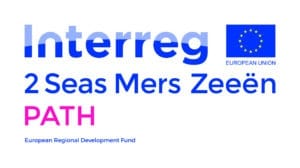3rd December 2021
We are delighted to share a Voices blog by Rachael Parker, Head of Public Health Operations (Public Health Nursing & Healthy Lifestyle Services), Public Health, Somerset County Council on her involvement in the European project PATH.

Rachael Parker, Head of Public Health Operations (Public Health Nursing & Healthy Lifestyle Services)
The Path project is an exciting European perinatal mental health project which commenced in 2019. I was delighted to be asked by the iHV to write about the employment recommendations which Cathy Lowenhoff, an iHV Fellow, and I had the pleasure of being part of. PATH is part of the Interreg VA 2 Seas collaboration funded by the European Development Fund. It brings together 13 partner organisations from France, Belgium, the Netherlands, and the UK to share a vast range of clinical, technical, and employment expertise to support families across an area of Europe known as the “2Seas region”. The iHV, as a partner organisation, has embraced the learning within PATH through international collaboration and engagement with a range of professional sectors to create unique resources to support families during the perinatal period.
A key piece of work for PATH was to understand how to support parental wellbeing in the workplace. The iHV undertook a literature review and then, along with PATH partners at Southampton City Council, we undertook further research and interviews with parents and employers, resulting in ten parental workplace wellbeing recommendations for employers. We anticipate that the standards and accompanying report will:
- raise awareness in the workplace about perinatal mental health
- recognise the challenges for new parents, both mothers and fathers
- identify factors that can contribute to increased risk of mental health problems during this period
- encourage the creation of work-life balance for employees allowing them to fulfil the essential responsibilities of caring, family life, and work.
The findings from the PATH research have resonated with all European partners, and Odisee University in Belgian will adopt the recommendations in early 2022, developing a parent toolbox for employers from the PATH research.
Colleagues at Southampton City Council have developed a free employer training session specifically for managers and HR professionals, which they have been promoting through employer networking events. It provides employers with an opportunity to learn more about emotional and perinatal mental health and give practical support for new and expectant parents, based on the evidence-based recommendations. The sessions are available to book now, either face to face or online, for any employers outside of the local area. The employer’s section of the PATH website provides the recommendations and accompanying links and tools.
For publication and further detailed information on the literature review and interviews with parents and focus groups with employers resulting in the development of these workplace recommendations for employers, please visit the 2 Seas PATH Project page on our website here.
Many of us would acknowledge the transition to parenthood is a stressful and challenging time for new parents, and the risk of experiencing mental health difficulties is higher, and work-life balance is a considerable challenge. For many people, the two essential life domains that impact their mental state and wellbeing are work and family (Michel, et al., 2011).
In the UK alone, there are 19.2 million families and 75.1% of mothers, and 92.6% of fathers with dependent children are in work. Work-life balance policies contribute to the achievement of gender equality by promoting the participation of women in the labour market and the equal sharing of caring responsibilities. A survey found that 3 in 10 mothers, compared to 1 in 30 fathers with a child under 14, said they had reduced their working hours because of childcare reasons (ONS, 2019).
The challenges of caring responsibilities, combined with a lack of policies to support new parents, can directly impact the wellbeing of parents and their children. Employers will also experience absenteeism, reduced productivity, and increased costs (WHO, 2005). In addition, concepts such as presenteeism can occur when employees go to work but cannot function effectively. In new parents, this can be a result of fatigue and sleep deprivation. Parents may also suffer from Leavism (employees working while on holiday, sick leave, or outside contracted hours) to meet the demands of work and family life.
All European countries offer various types of leave for new parents, whether it be maternity leave for new mothers, paternity leave for new fathers, or parental leave for one or both parents. Many countries offer extended leave periods to new mothers, with allowances paid by the state or the employer. Paternity leave is generally shorter, with the average period being two weeks. In Portugal and the UK, parents can shorten maternity leave in favour of sharing parental leave. However, the use of the policy is very low, with uptake among eligible couples at just 2-8%.
In supporting parents to maintain good mental health or manage existing mental health problems, how do we enable parents to deal with the challenges of parenthood when they are: taking protected leave from work; when they are returning to work; or juggling work and family life? Do we support them enough in returning to the workplace, and do we understand their individual parenting needs? The PATH parental workplace wellbeing recommendations for employers and accompanying training and resources offer employers an opportunity to support their employees during this critical period of their life and understand more about how they can adopt the recommendations.
Parent-friendly organisations are more likely to retain experienced employees, reduce the costs arising from absence and recruiting new staff, and provide the foundations for a loyal, happier, motivated, and more productive workforce and help build healthy families. Some organisations are already doing this well, for example, John Lewis stores in 2021 were the first large retail organisation to offer employees equal paternity leave for the first six months of their child’s life.
Workplaces need to be parent-friendly and psychologically safe, providing an environment where employees can share their stresses and concerns within a supportive culture of acceptance and empathy.
For further information about the recommendations or signposting to additional advice, please contact [email protected]
Rachael Parker, Head of Public Health Operations (Public Health Nursing & Healthy Lifestyle Services), Public Health, Somerset County Council
References
Michel JS, Kotrba LM, Mitchelson JK, Clark MA, Baltes BB (2011) Antecedents of work-family conflict: a meta-analytic review. J Organisational Behaviour 32(5): 689 – 725
Office of National Statistics (2019) Families and the Labour Market, UK 2019. www.ons.gov.uk
WHO 2005 Mental Health Programmes and Policies in the Workplace
John Lewis to offer equal parental leave to all staff | John Lewis | The Guardian







